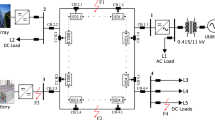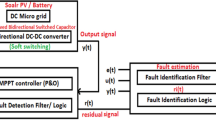Abstract
Standalone low-voltage DC (LVDC) microgrids have emerged as potential alternatives in the context of effective rural electrification. The factors of reduction in conversion costs, paradigm shift in voltage levels of domestic loads made LVDC Microgrids more preferable. Being driven by intermittent renewable sources and dynamic loading, the voltage control is quite crucial and challenging to ensure a stable LVDC microgrid. Furthermore, delivering the control objectives becomes very difficult in the presence of sensor faults. In order to address this issue of sensor faults, this work proposes an Extended Luenberger Observer-based Active Sensor Fault-Tolerant Control (ELO-ASFTC) scheme. The proposed control scheme consists of the aspects of fault detection and isolation (FDI), and control reconfiguration. The proposed control scheme achieved the voltage tracking objective of the LVDC microgrid even under the presence of a faulty DC bus voltage sensor. The performance of the proposed scheme is observed in handling different sensor fault scenarios, loading conditions and irradiance changes. The effectiveness of the proposed control scheme is studied analytically, through the simulation studies in MATLAB, and hardware experimentation on the in house LVDC microgrid test bed.





















Similar content being viewed by others
References
Jhunjhunwala A, Kaur P (2020) Solar energy, DC distribution, and microgrids: ensuring quality power in rural India. IEEE Electrif Mag 6(4):32–39
Ullah S, Haidar AMA, Zen H (2020) Assessment of technical and financial benefits of AC and DC microgrids based on solar photovoltaic. Electr Eng 102:1297–1310
Anand S, Fernandes BG (2010) Optimal voltage level for DC microgrids. In: IECON 2010—36th annual conference on IEEE industrial electronics society, pp 3034–3039
Chandra MS, Kumar LV, Mohapatro S (2020) Voltage control and energy management of solar PV fed stand-alone low voltage DC microgrid for rural electrification. In: 2020 21st National Power Systems Conference (NPSC)
Eid BM, Guerrero JM, Abusorrah AM et al (2021) A new voltage regulation strategy using developed power sharing techniques for solar photovoltaic generation-based microgrids. Electr Eng 103:3023–3031
Bacha S, Munteanu I, Bratcu AI (2014) Power electronic converters modelling and control: with case studies. Springer, London, p 454
Alshareef M, Lin Z, Li F, Wang F (2021) A grid interface current control strategy for DC microgrids. CES Trans Electr Mach Syst 5(3):249–256
Ansari S, Zhang J, Singh RE (2022) A review of stabilization methods for DCMG with CPL, the role of bandwidth limits and droop control. Prot Control Mod Power Syst 7(2):1–12
Fulwani DK, Singh S (2017) Mitigation of negative impedance instabilities in DC distribution systems. Springer briefs in applied sciences and technology. Springer, Berlin
Agarwal A, Deekshitha K, Singh S, Fulwani D (2015) Sliding mode control of a bidirectional DC/DC converter with constant power load. In: 2015 IEEE first international conference on DC microgrids (ICDCM), pp 287–292
Zhao Y, Qiao W, Ha D (2014) A sliding-mode duty-ratio controller for DC/DC buck converters with constant power loads. IEEE Trans Ind Appl 50(2):1448–1458
Qureshi MA, Ahmad I, Munir MF (2018) Double integral sliding mode control of continuous gain four quadrant quasi-Z-source converter. IEEE Access 6:77785–77795
Mehdi M, Jamali SZ, Khan MO, Baloch S, Kim CH (2020) Robust control of a DC microgrid under parametric uncertainty and disturbances. Electr Power Syst Res 179:106074
Li F, Lin Z (2021) Novel passive controller design for enhancing boost converter stability in DC microgrid applications. IEEE J Emerg Sel Top Power Electron 9(6):6901–6911
Andrés-Martínez YO, Flores-Tlacuahuac A, Ruiz-Martinez OF, Mayo-Maldonado JC (2021) Nonlinear model predictive stabilization of DC–DC boost converters with constant power loads. IEEE J Emerg Sel Top Power Electron 9(1):822–830
Wu J, Lu Y (2019) Adaptive backstepping sliding mode control for boost converter with constant power load. IEEE Access 7:50797–50807
Dissanayake AM, Ekneligoda NC (2019) Adaptive passivity based control of DC–DC power electronic converters. In: 2019 IEEE applied power electronics conference and exposition (APEC), pp 2984–2988
Ghalib MA, Shehat EG, Thomas J et al (2019) Adaptive droop control for high-performance operation in low-voltage DC microgrids. Electr Eng 101:1311–1322
Arunkumar CR, Manthati UB, Punna S (2022) Supercapacitor-based transient power supply for DC microgrid applications. Electr Eng 104:463–472
Wang Y, Zhou D, Qin SJ, Wang H (2008) Active fault-tolerant control for a class of nonlinear systems with sensor faults. Int J Control Autom Syst 6(3):339–350
Amin AA, Mahmood-ul-Hasan K (2019) Robust active fault-tolerant control for internal combustion gas engine for air-fuel ratio control with statistical regression based observer model. Meas Control 52(9):1179–1194
Chetouani Y (2008) Using the Kalman filtering for the fault detection and isolation (FDI) in the nonlinear dynamic processes. Int J Chem Reactor Eng. https://doi.org/10.2202/1542-6580.1411
Tabasian R, Ghanbari M, Esmaeli A, Jannati M (2020) Control of three-phase induction machine drives during open-circuit fault: a review. IETE J Res. https://doi.org/10.1080/03772063.2020.1724833
Foo GHB, Zhang X, Vilathgamuwa DM (2013) A sensor fault detection and isolation method in interior permanent-magnet synchronous motor drives based on an extended Kalman filter. IEEE Trans Ind Electron 60(8):3485–3495
Nair DV, Murty M (2020) Reconfigurable control as actuator fault-tolerant control design for power oscillation damping. Prot Control Mod Power Syst 5(8):1–12
Ben Safia Z, Kharrat M, Allouche M, Chaabane M (2021) TS fuzzy fault-tolerant tracking control of a PV pumping system based on an induction motor. IETE J Res. https://doi.org/10.1080/03772063.2021.1958387
Mahmoud MS, Xia Y (2014) Analysis and synthesis of fault-tolerant control systems. Wiley, London
Jadidi S, Badihi H, Zhang Y (2020) Passive fault-tolerant control strategies for power converter in a hybrid microgrid. Energies 13(21):5625
Yanarates C, Zhou Z (2022) Design and cascade PI controller-based robust model reference adaptive control of DC–DC boost converter. IEEE Access 10:44909–44922
Author information
Authors and Affiliations
Corresponding author
Additional information
Publisher's Note
Springer Nature remains neutral with regard to jurisdictional claims in published maps and institutional affiliations.
Rights and permissions
Springer Nature or its licensor (e.g. a society or other partner) holds exclusive rights to this article under a publishing agreement with the author(s) or other rightsholder(s); author self-archiving of the accepted manuscript version of this article is solely governed by the terms of such publishing agreement and applicable law.
About this article
Cite this article
Satya Sai Chandra, M.V., Mohapatro, S. Active sensor fault tolerant control of bus voltage in standalone low voltage DC microgrid. Electr Eng 105, 1079–1092 (2023). https://doi.org/10.1007/s00202-022-01716-z
Received:
Accepted:
Published:
Issue Date:
DOI: https://doi.org/10.1007/s00202-022-01716-z




